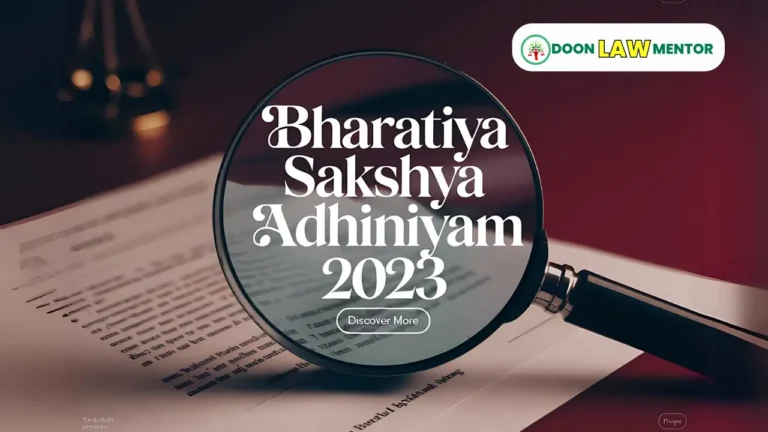In Rutu Mihir Panchal (2025), the Supreme Court held courts can direct legislative audits to ensure statutes meet their goals, reinforcing the Rule of Law. Learn the case, its legal impact, and exam tips for judiciary aspirants.
Table of Contents
Introduction
In a landmark judgment, the Supreme Court of India in Rutu Mihir Panchal and others vs. Union of India and others (2025 SC) affirmed that courts have the power and duty to direct the executive to conduct performance audits of statutes to ensure they achieve their intended objectives. This ruling, delivered by Justices PS Narasimha and Joymalya Bagchi, underscores the judiciary’s role in upholding the Rule of Law by prompting the executive to review laws that fail to benefit their intended beneficiaries. While deciding a challenge to the Consumer Protection Act, 2019, the Court clarified that such judicial directions must be based on demonstrable data showing a statute’s failure. This case is a must-know for judiciary exam aspirants, offering insights into constitutional law, judicial review, and legislative accountability. This blog explores the case details, the Court’s reasoning, its implications, and preparation strategies for exams like DJS, MPCJ, and AIBE.
Background of the Case
The Rutu Mihir Panchal case arose from a plea challenging the provisions of the Consumer Protection Act, 2019, specifically the pecuniary jurisdiction of district, state, and national consumer commissions, which is based on the value of consideration rather than the quantum of compensation claimed. The petitioners argued that this framework failed to achieve the Act’s objective of providing accessible and efficient consumer redressal. During the hearing, they contended that the 2019 Act was not meeting its goals, prompting the Supreme Court to address the broader issue of legislative audits—a process to assess whether statutes are functioning as intended.
The Court rejected the challenge to the Act’s provisions but used the opportunity to articulate the judiciary’s role in ensuring statutory effectiveness, particularly when laws become mired in bureaucratic or judicial delays.
Read More: SC: Seniority in Direct Recruitment Must Be Based on Marks, Not Past Service
Supreme Court’s Ruling
In a comprehensive judgment, the bench made pivotal observations about the judiciary’s role in directing statutory performance audits and ensuring the Rule of Law:
- Auditing as Part of Rule of Law:
- The Court held that reviewing and assessing a statute’s implementation is integral to the Rule of Law, ensuring laws serve their intended purpose.
- It stated: “Reviewing and assessing the implementation of a statute is an integral part of Rule of Law. It is in recognition of this obligation of the executive government that the constitutional courts have directed governments to carry performance audit of statutes.”
- Judiciary’s Power and Duty:
- Courts have both the power and duty to direct the executive to audit statutes when there is demonstrable judicial data or cogent material showing the law’s failure to benefit its beneficiaries.
- The Court referenced Yash Developers v. Harihar Krupa Co-operative Housing Society Ltd (2024), which established that assessing a statute’s performance is an implied duty of the executive.
- Conditions for Judicial Intervention:
- Judicial directions for audits must be based on evidence, such as statutory gridlock in bureaucratic or judicial processes that delays or defeats the law’s objectives.
- The Court noted: “This direction must be predicated on a finding that the statute has, through demonstrable judicial data or other cogent material, failed to ameliorate the conditions of the beneficiaries.”
- Limits of Judicial Role:
- While courts can facilitate audits and suggest amendments, they cannot compel legislative reforms, respecting the separation of powers.
- The Court acknowledged India’s legislative system, where most laws are government-introduced, with rare private member bills, necessitating judicial prompting for executive review.
- Consumer Protection Act, 2019:
- The Court highlighted the roles of the Central Consumer Protection Council and Central Consumer Protection Authority, statutory bodies tasked with advising the government on the Act’s implementation.
- It directed these bodies, under Sections 3, 5, 10, 18–22, to conduct surveys, reviews, and audits to ensure effective consumer redressal, emphasizing efficiency, expertise, integrity, transparency, and accountability.
- Practical Implications:
- The ruling empowers courts to act as facilitators of legislative accountability, promoting debate and discussion on statutory performance without overstepping into legislative domain.
- It sets a precedent for judicial intervention when laws fail due to systemic issues, ensuring the executive addresses such shortcomings promptly.
Read More: Gujarat HC: Godhra Could Have Been Prevented | Landmark Judgement 2025
Legal and Constitutional Implications
The Rutu Mihir Panchal ruling has far-reaching implications for constitutional law, judicial review, and legislative governance:
- Strengthening Rule of Law:
- By mandating audits, the judiciary ensures that laws align with their preambular objectives, reinforcing public trust in governance and protecting citizens’ rights under Article 14 (equality) and Article 21 (right to life).
- Judicial Review and Separation of Powers:
- The ruling balances judicial activism with restraint, allowing courts to prompt executive action without encroaching on legislative authority, a key concept for constitutional law questions.
- Administrative Accountability:
- Statutory bodies like the Consumer Protection Council and Authority are now under greater scrutiny to perform efficiently, aligning with administrative law principles of transparency and accountability.
- Consumer Protection:
- The directive to audit the Consumer Protection Act, 2019 ensures better implementation, addressing delays and inefficiencies in consumer redressal mechanisms, a topic relevant for AIBE and APO exams.
- Judiciary Exam Relevance:
- The case is critical for topics like judicial review, Rule of Law, separation of powers, and statutory interpretation. Aspirants should study its implications for constitutional law (Articles 14, 21, 32) and administrative law (duties of statutory bodies).
Sample MCQ: Q: In Rutu Mihir Panchal vs. Union of India (2025), the Supreme Court held that courts can direct the executive to: A) Amend statutes directly B) Conduct performance audits of statutes C) Abolish ineffective laws D) Appoint new statutory bodies Answer: B) Conduct performance audits of statutes
Read More: SC Allows Modification of Arbitration Awards Under Article 142 | Gayatri Balasamy Judgment 2025
Why This Matters for Judiciary Aspirants
The Rutu Mihir Panchal case is a goldmine for judiciary exam preparation, intersecting constitutional law, administrative law, and consumer protection:
- Constitutional Law: The ruling’s emphasis on Rule of Law and judicial review connects to Articles 14, 21, 32, and separation of powers, common in prelims and mains.
- Administrative Law: The directive to statutory bodies highlights their duties and accountability, relevant for questions on statutory interpretation and delegated legislation.
- Consumer Protection: The focus on the Consumer Protection Act, 2019 is crucial for exams like AIBE, covering pecuniary jurisdiction and statutory bodies.
- Current Affairs: As a 2025 judgment, it’s a hot topic for general knowledge and interview rounds in DJS, MPCJ, and CLAT.
Preparation Tips for Judiciary Exams
- Study Constitutional Provisions:
- Memorize Articles 14, 21, 32 and their application in judicial review cases.
- Understand separation of powers and the judiciary’s facilitative role.
- Case Law Analysis:
- Study Yash Developers (2024) and other cases on statutory audits, e.g., Common Cause vs. Union of India (2018), for judicial directions to the executive.
- Link Rutu Mihir Panchal to Rule of Law and administrative accountability.
- Consumer Protection Act, 2019:
- Revise Sections 3, 5, 10, 18–22 and the roles of the Central Consumer Protection Council and Authority.
- Understand pecuniary jurisdiction and its impact on consumer redressal.
- Practice Questions:
- Solve MCQs and mains questions on judicial review, statutory audits, and Rule of Law. Use past papers from DJS, MPCJ, and AIBE.
- Example: “Discuss the judiciary’s role in directing statutory audits, with reference to Rutu Mihir Panchal (2025).”
- Current Affairs Integration:
- Follow updates on Supreme Court judgments via PIB, The Hindu, or LiveLaw. Note how this ruling impacts consumer rights and governance.
Conclusion
The Supreme Court’s ruling in Rutu Mihir Panchal vs. Union of India (2025) marks a significant step in reinforcing the Rule of Law by empowering courts to direct legislative audits when statutes fail their beneficiaries. By balancing judicial intervention with respect for separation of powers, the Court ensures that laws like the Consumer Protection Act, 2019 serve their purpose through efficient statutory bodies. For judiciary aspirants, this case is a critical study point for constitutional law, administrative law, and consumer protection, offering insights into judicial review and governance. Integrate this ruling into your preparation, practice relevant questions, and stay updated to excel in exams like DJS, MPCJ, and AIBE.
Join Our Courses: Master landmark judgments like Rutu Mihir Panchal and ace your judiciary exams with expert-led classes at Doon Law Mentor. Enroll now to boost your legal knowledge and succeed!
Tags: Rutu Mihir Panchal Case, Supreme Court 2025, Legislative Audit, Rule of Law, Consumer Protection Act, Judiciary Exam Preparation, Judicial Review
Hashtags: #RutuMihirPanchal #SupremeCourt2025 #LegislativeAudit #RuleOfLaw #ConsumerProtection #JudiciaryExams #DoonLawMentor








